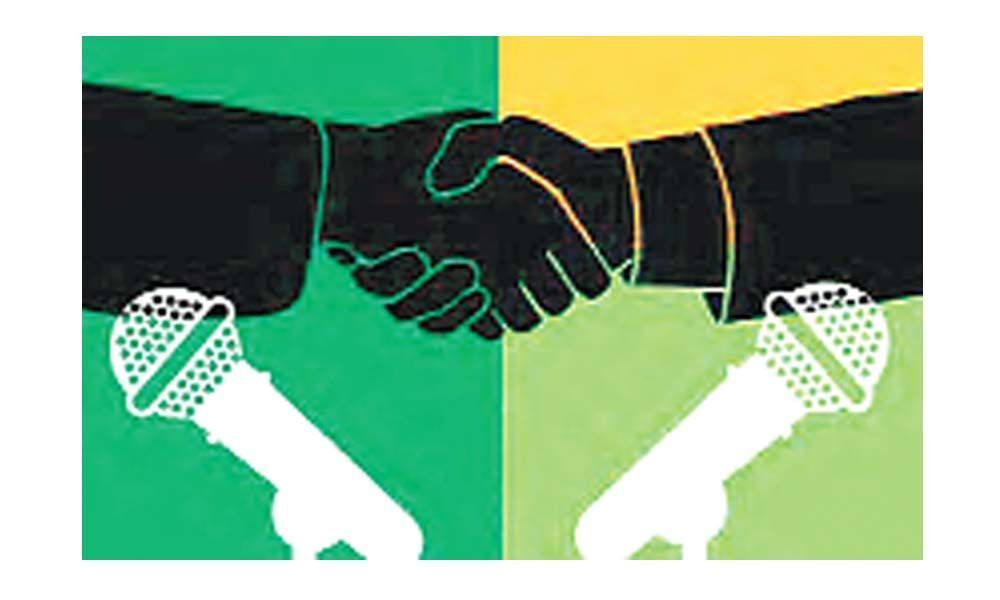J & K imbroglio : Can backchannel diplomacy be effective enough?

In a significant diplomatic rebuff, over an invitation to Kashmiri separatist group Hurriyat, the Indian government has, on the record, boycotted the Pakistan national day reception in New Delhi on March 22
In a significant diplomatic rebuff, over an invitation to Kashmiri separatist group Hurriyat, the Indian government has, on the record, boycotted the Pakistan national day reception in New Delhi on March 22.
It is worth mentioning here that in the past four years, union ministers V K Singh, M J Akbar, G S Shekhawat and Prakash Javadekar have represented the government of India at the Pakistan day reception.
Despite the fact that the Indian government has officially boycotted the event, according to Pakistan Prime Minister Imran Khan, he received the following message from PM Modi: "I extend my greetings & best wishes to the people of Pakistan on the National Day of Pakistan.
It is time that people of sub-continent work together for a democratic, peaceful, progressive & prosperous region, in an atmosphere free of terror and violence."
Considering the various developments that took place after the Pulwama terrorist attack that occurred on February 14 and the above message which was apparently sent by Prime Minister Narendra Modi, it becomes clearly evident that India is looking only for the peaceful development of the region by averting conflict with the neighbouring country.
However, the situation at the border of the two nations in Jammu and Kashmir is still overwrought. At this juncture, surely, traditional diplomacy as a means of conflict resolution cannot play a key role.
Traditional diplomacy has, for many years, involved bilateral talks in closed chambers between the governments of the two nations — but to no avail.
Such negotiations may be proven better in resolving only such issues as water sharing and power sharing between nations but not in getting a perpetual solution to a complex issue as Jammu and Kashmir problem.
In this milieu, there arises a need for the backchannel diplomacy (also referred to as Track 2 Diplomacy), which is often communicated through an informal intermediary or through a third party.
Once traditional channels of negotiation, mediation and conflict management become unproductive and need to be supplemented, backchannel diplomacy plays an instrumental role.
As far as Jammu and Kashmir issue is concerned, it is essential to have mechanisms that intend to transform the constraints of existing discourse.
This can be done by impelling public opinion on the need to look at creative alternatives, thereby expelling the rotted opinions based on conventional wisdom. A flamboyant issue here is — backchannel diplomacy between India and Pakistan evokes interest not only for these two countries but also internationally.
In fact, backchannel diplomacy between India and Pakistan is not any new tender — already it has been in vogue. In the 1990s, it clutched open responsiveness when the international focus of attention on Jammu and Kashmir enlarged.
The very first attempt of backchannel diplomacy to address problems in Jammu and Kashmir was undertaken by a US-based Kashmir Study Group. It was headed by Farookh Kathwari, an American national lived in Srinagar.
Later, backchannel diplomacy played its part after the Kargil conflict and the tensions that followed the attack on the Indian Parliament, on December 13, 2001.
Based on an unequivocal pledge from President Musharraf that he would not allow territory under Pakistan's control to be used for terrorism against India, there was an agreement to resume the "Composite Dialogue Process" between India and Pakistan — the agreement to this effect was made on January 6, 2004.
At the first instance, the aforesaid development may seem as if it was the role played by traditional diplomacy. Nonetheless, the assurance from the Pakistan President Musharraf was only due to the aftereffects of terrorist strikes on September 9, 2001, in New York and Washington.
There was a heavy pressure by the US to ban groups like the Lashkar e Taiba and the Jaish- e - Mohammed. In the same backdrop, under U.N. Security Council Resolution 1373, the U.N. Security Council has banned and declared these groups as international terrorist organisations.
This way, the U.N. Security Council acted as an intermediary in the process of Track 2 Diplomacy between India and Pakistan.
Again in December 2004, a Track 2 meeting was held in Kathmandu. One significant issue about this meeting was — for the first time ever, politicians, journalists and representatives of civil society from either side of the Line of Control (LOC) in Jammu and Kashmir were brought together in this meeting.
The only virtuous outcome as promulgated by the Pugwash Report issued after the December 2004 meeting was — all participants admitted that the human dimension of the conflict should take priority over geo-strategic considerations.
However, the report noted that there was no consensus in recognising the starting point for evolving mechanisms of conflict resolution.
It is a matter of fact that backchannel diplomacy may play a crucial role in relaxing the vital issues.
On many occasions, when Governments intend to duck publicity, before entering into the realm of official and formal talks, they utilise informal channels of diplomacy (backchannel diplomacy), using reliable and steadfast individuals and institutions for preparation of their negotiating approaches.
In some serious issues like Jammu and Kashmir, the foundations of the conflict are so deep-rooted that after so many pointless attempts there won't be any official room politically to seek resolution or phasing down of the untoward situation.
In such circumstances, the backchannel diplomacy process can primarily seek avenues to bridge differences, initiate a dialogue between the countries to share concerns, influence public opinion and keep communication channels open.
(The author is an Air Veteran, a mass communicator and an author of more than 10 mass media books)










